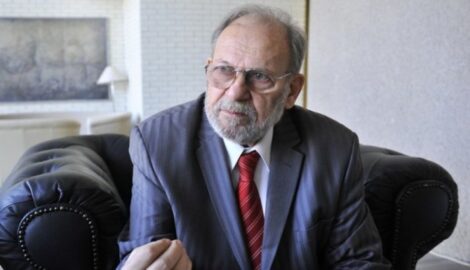Bosnian Muslims again battle St. Louis County over proposed mosque

A congregation of Bosnian Muslims that fought St. Louis County leaders over zoning issues six years ago is again battling county officials who have revoked the group’s tax-exempt status.
The Islamic Community Center filed a lawsuit earlier this month challenging that decision, saying that while the recession had slowed its plans for a 4.7-acre parcel in south St. Louis County, it has maintained the property and has always intended to develop it into a religious and community center.
St. Louis County’s Board of Equalization argued that by letting the land sit vacant for years without pursuing its religious mission there, the Bosnian group had ceded its First Amendment right to exempt the property from taxation.

“No evidence was presented to establish any actual or regular use of the property for any religious educational or charitable purposes,” a board report said. “The property is vacant and unused real estate.
In 2010, the county withdrew the Islamic Community Center’s tax exemption. The group appealed to the Missouri State Tax Commission, which sided with the county last month.
County Assessor Jake Zimmerman referred a reporter to the Board of Equalization, which declined to provide a board member to answer questions.
The Bosnian group’s lawsuit comes as another nonprofit — Presbyterian Manors, which is affiliated with the Presbyterian Church, USA — is challenging St. Louis County’s decision to deny it tax exemption for a senior living complex in Kirkwood.
In addition, pastors in East St. Louis are squaring off against the city over a $100 “annual registration fee” on churches and nonprofits for fire inspections.
The Islamic Community Center bought the property, at 2537 Lemay Ferry Road, in July 2006, for $1.25 million “with the intent and purpose of operating a community center that would include recreational, educational and religious activities,” according to court documents.
The group was already worshipping at a mosque in south St. Louis. But with many area Bosnians moving from the city to south St. Louis County, the Islamic Community Center’s religious leader, Imam Muhamed Hasic, decided the center should have a presence in the county.
The group planned to have outdoor basketball courts and soccer fields on the property and to construct a community center, which would include a worship space.
Aside from being the spiritual leader of St. Louis-area Bosnians, Hasic is also the most visible senior Muslim leader in the area. He’s president of the Interfaith Partnership of Greater St. Louis (St. Louis Archbishop Robert Carlson, of the Roman Catholic Church, is chairman of the group’s cabinet) and attends many religious functions in St. Louis as a representative of area Muslims.
Sarah Barringer Gordon, a constitutional law professor and professor of history at the University of Pennsylvania, said that it had “always been the case that religious organizations are not allowed to buy property, take them off the tax rolls and then do nothing with them.”
Similarly, she said, a religious organization that owns a for-profit business unrelated to its mission is not exempted from paying taxes on that business.
“There are boundaries, and one does not want to cut such a wide swatch of discretion that you don’t catch fraudulent” religious organizations trying to cheat the government, Gordon said.
“It depends on good faith going both ways,” she continued. “If a group is proceeding in good faith, although not terribly quickly and without doing a very good job of communicating with various authorities that their financing had dried up, they may still have every intention of pursuing their original mission. Maybe they’re a little sloppy, but not trying to work a fraud.”
Indeed, the Islamic Community Center had spent tens of thousands of dollars contracting with design and architecture firms to produce plans and drawings for the community center, according to court documents. Though, it said, “the project has not progressed as quickly as the ICC would have liked.”
But the existence of such plans, county officials found, “does not establish that the actual and regular use of the subject property is for religious, educational or charitable purposes.”
The State Tax Commission found “the evidence fails to establish what if any ‘renovations’ have actually taken place” on the property.
Jay Kanzler, an attorney for the Muslim group, said Hasic had offered to place a new deadline on moving forward with the land’s development, if the county would agree to drop its pursuit of the group’s tax bill since 2010.
“This is a group of working people, immigrants,” said Kanzler. “Their donations toward the center come in $10 and $20 increments. If they have to pay this tax bill, construction will never happen.”
Source: St. Louis Post Dispatch



